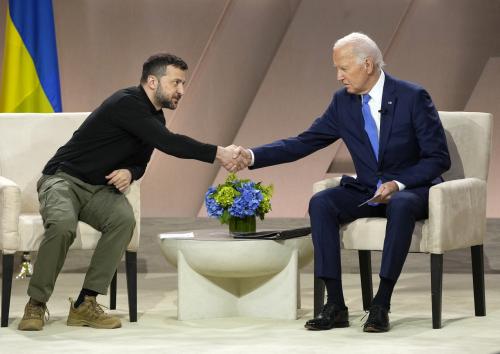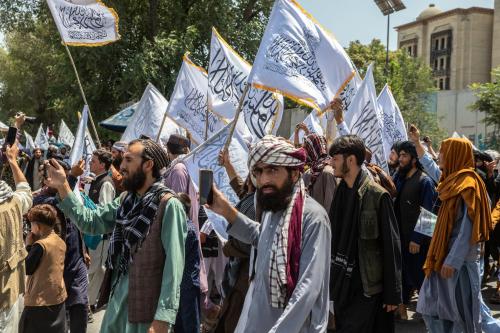Content from the Brookings Doha Center is now archived. In September 2021, after 14 years of impactful partnership, Brookings and the Brookings Doha Center announced that they were ending their affiliation. The Brookings Doha Center is now the Middle East Council on Global Affairs, a separate public policy institution based in Qatar.
Five months in, the Obama administration’s response to the Arab spring has been a disappointment. Sure, it could have been worse. But it could just as easily have been much better. U.S. policy has borne the trademarks of President Barack Obama’s major successes—or failures, depending on your perspective. On health care and financial reform, Obama was careful and cautious, avoiding maximalist impulses, splitting the difference between competing options, and settling for the language of pragmatism rather than that of inspiration. It appears that Obama has taken this same approach in the Arab world.
The results speak for themselves. The Arab spring has ended. After the euphoria of Egypt’s revolution, protests have broken out in most Arab countries. They have been met with more, not less, force, as regimes—including close U.S. allies—wage war on their own people. Just as there is a new ethic of protest, there is also a new ethic of violence in response.
Facing a Middle East in turmoil, President Obama will have a chance to regain the initiative and articulate his vision for the region on Thursday, when he is scheduled to give a major address. This time, platitudes about America’s commitment to democracy will not do, because they ring hollow to Arab audiences. No one really questions that Washington believes in democracy and universal human rights—in theory. What they doubt is the ability and willingness to translate such abstractions into real policy changes on the ground. Any major speech should address this dilemma head on.
Doing so will require something as simple and powerful as it is unlikely: a real apology. The United States has a tragic history in the region. For more than five decades, successive administrations, with surprising consistency, funded, supported, and armed some of the region’s most repressive governments. (We still do.) This, we now know, not only betrayed our ideals but undermined our strategic interests in the region. Autocracies do not, after all, last forever. If there has ever been a time to reassess and reorient U.S. policy in the Middle East, it is now.
Significant changes in established policy, as rare as they are, are often the product of coming to terms with past mistakes—and acknowledging them to others. As Jennifer Lind, a scholar of the politics of apology, argued in Foreign Affairs, “how countries remember their pasts conveys information about their future behavior.” If the United States issued a high-profile apology for past support of authoritarianism, it would put more pressure on policymakers to hew to that standard in the future (or at least to attempt to). If he’s looking for inspiration, President Obama can take a page from his predecessor’s playbook. In 2003, President George W. Bush proclaimed, “Sixty years of Western nations excusing and accommodating the lack of freedom in the Middle East did nothing to make us safe, because in the long run stability cannot be purchased at the expense of liberty.”
President Obama must take this several steps further. Instead of saying things that most Arabs view as inaccurate descriptions of reality (such as “wherever people long to be free, they will find a friend in the United States”), he should speak frankly and explain that sometimes competing interests guide American policy, including in ways that contradict our ideals. This is inevitable, as even foreign-policy idealists will admit. At the same time, the president should lay out his vision of how ideals and interests now converge. If democracy is the eventual endpoint of all Arab regimes, it is obviously in America’s interest to be on the right side of that change. Aligning with regimes at the expense of publics will be damaging wherever regimes fall, as some surely will.
In reorienting U.S. policy, the problem may be one of temperament. Obama has never been comfortable with overt ideological displays. Unlike Bush, he has never seemed at ease with even the notion of aggressive American support of democracy. Where Obama shines is in his ability to place grievance in its historical context, as he did in his 2008 Philadelphia speech on race, and his related appreciation for human dignity and agency. Spencer Ackerman once described Obama’s preferred foreign-policy approach as “dignity promotion.” As Lind has written, the act of apology—in its willingness to affirm the pain of others—can be critical to the restoration of dignity.
The strongest reaction is likely to come at home rather than from abroad. When countries apologize too much or too often, domestic backlash is sure to follow, usually among conservatives who interpret apology as a sign of weakness rather than strength. As one of the more nationalist Western countries, the United States is particularly prone to this. That said, no one is asking Obama to make a habit of “groveling.” In fact, following an apology and explanation of past policies with unabashed pro-democracy rhetoric will temper the criticism from the neoconservative camp.
Ultimately, in this context, apologies are a means to a greater end. They provide a justification for a bolder, more creative policy in the Middle East. They provide a narrative pivot. Importantly, they recognize that Arabs have had to live with something we would never accept for ourselves. Apologies are also, perhaps counterintuitively, an affirmation of what makes America great. As Peter Beinart once wrote, “it is precisely our recognition that we are not angels that makes us exceptional.” We have not been angels in the Middle East. Admitting it would be a good start.


Commentary
Op-edSay Sorry, Mr. President: What Obama Needs to Convey in this Week’s Middle East Speech
May 18, 2011